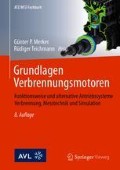Zusammenfassung
Null‐ und eindimensionale Simulationsmodelle sind insbesondere für die Prognose der Eigenschaften eines Motors schon während der Auslegungsphase geeignet. Bei Ottogasmotoren besteht die Herausforderung, dass eine Vielzahl von Brennverfahren und Kraftstoffen abzubilden sind. Um die Entwicklung von immer neuen Simulationsmodellen für diese Spezialfälle vermeiden zu können, ist es nützlich, eine möglichst allgemeingültige Modellierung zur Verfügung zu haben. Ein hohes Maß an Allgemeingültigkeit kann von Modellen erwartet werden, die weitgehend auf physikalischen Gesetzen beruhen und nur ein geringes Maß an Phänomenologie enthalten. Zu diesem Zweck wurde am LEC eine konsistente Simulationsmethodik entwickelt, die diesen Bedingungen genügt (vgl. Chmela et al. 2006, 2008). Eine Übersicht über die am LEC zur Modellierung der Vorgänge im Gasmotor verfügbaren Simulationsmodelle findet sich in Abb. 45.1.
Access this chapter
Tax calculation will be finalised at checkout
Purchases are for personal use only
Literatur
Chmela, F., Dimitrov, D., Pirker, G., Wimmer, A.: Konsistente Methodik zur Vorausrechnung der Verbrennung in Kolbenkraftmaschinen. MTZ 67(06) (2006)
Chmela, F., Dimitrov, D., Wimmer, A.: Simulation der Verbrennung bei Vorkammer-Großgasmotoren. 11. Tagung „Der Arbeitsprozess des Verbrennungsmotors“, Graz. (2007)
Chmela, F., Pirker, G., Dimitrov, D.: Wimmer, A.: „Globalphysikalische Modellierung der motorischen Verbrennung“. In: Simulation und Aufladung von Verbrennungsmotoren, S. 67–93. Springer, Berlin (2008)
Dimitrov, D., Chmela, F., Wimmer, A.: Eine Methode zur Vorausberechnung des Klopfverhaltens von Gasmotoren. 4. Dessauer Gasmotoren-Konferenz, Dessau. (2005)
Dinkelacker, F., Ratzke, A., Kuppa, K., Betageri, V., Butzbach, G.: Wege zu einem UHC-Berechnungsmodell für Gasmotoren. 14. Tagung „Der Arbeitsprozess des Verbrennungsmotors“, Graz., S. 226–240 (2013)
Jobst, J., Chmela, F., Wimmer, A.: Simulation von Zündverzug, Brennrate und NOx-Bildung für direktgezündete Gasmotoren. 1. Tagung „Motorprozesssimulation und Aufladung“, Berlin. (2005)
Korb, B., Wachtmeister, G., Kuppa, K., Dinkelacker, F.: THC-emissions in gas engines – experimental and numerical studies. 15. Tagung „Der Arbeitsprozess des Verbrennungsmotors“, Graz., S. 211–227 (2015)
Kuppa, K.: Computational fluid dynamics modelling of combustion and emissions in gas engines. Berichte aus dem ITV – Band 3/2017. PZH Verlag, Hannover (2017). Dissertation Univ. Hannover
Kuppa, K., Goldmann, A., Schöffler, T., Dinkelacker, F.: Laminar flame properties of natural gas / hydrogen blends at gas engine conditions, Fuel (2017). Eingereicht 2017
Magnussen, B.F., Hjertager, B.H.: On mathematical modeling of turbulent combustion with special emphasis on soot formation and combustion. 16th International Symposium on Combustion. (1976)
Müller, U.C., Bollig, M., Peters, N.: Approximations for burning velocities and Markstein numbers for lean hydrocarbon and methanol flames. Combust. Flame 108, 349–356 (1997)
Pattas, K., Häfner, G.: Stickoxidbildung bei der ottomotorischen Verbrennung. MTZ 34, 12 (1973)
Ratzke, A.: Modellierung der Flammenausbreitung und des Flammenlöschens im Gasmotor. Berichte aus dem ITV – Band 3/2013. PZH Verlag, Hannover (2013). Dissertation Univ. Hannover
Ratzke, A., Schöffler, T., Kuppa, K., Dinkelacker, F.: Validation of turbulent flame speed models for methane–air-mixtures at high pressure gas engine conditions. Combust. Flame 162, 2778–2787 (2015)
Schöffler, T., Hoffmann, K., Koch, T.: Stoichiometric natural gas combustion in a single cylinder SI engine and impact of charge dilution by means of EGR. SAE Technical Paper 2013-24-0113. (2013)
Zhu, J., Wimmer, A., Schneßl, E., Winter, H., Chmela, F.: Parameter based combustion model for large pre-chamber gas engines. Proceedings of the ASME Internal Combustion Engine Division 2009 Spring Technical Conference, Milwaukee. ICES2009-76127. (2009)
Author information
Authors and Affiliations
Editor information
Editors and Affiliations
Rights and permissions
Copyright information
© 2018 Springer Fachmedien Wiesbaden GmbH, ein Teil von Springer Nature
About this chapter
Cite this chapter
Chmela, F., Pirker, G., Wimmer, A., Dinkelacker, F. (2018). Verbrennungsmodelle für Großgasmotoren. In: Merker, G., Teichmann, R. (eds) Grundlagen Verbrennungsmotoren. ATZ/MTZ-Fachbuch. Springer Vieweg, Wiesbaden. https://doi.org/10.1007/978-3-658-19212-9_45
Download citation
DOI: https://doi.org/10.1007/978-3-658-19212-9_45
Published:
Publisher Name: Springer Vieweg, Wiesbaden
Print ISBN: 978-3-658-19211-2
Online ISBN: 978-3-658-19212-9
eBook Packages: Computer Science and Engineering (German Language)

